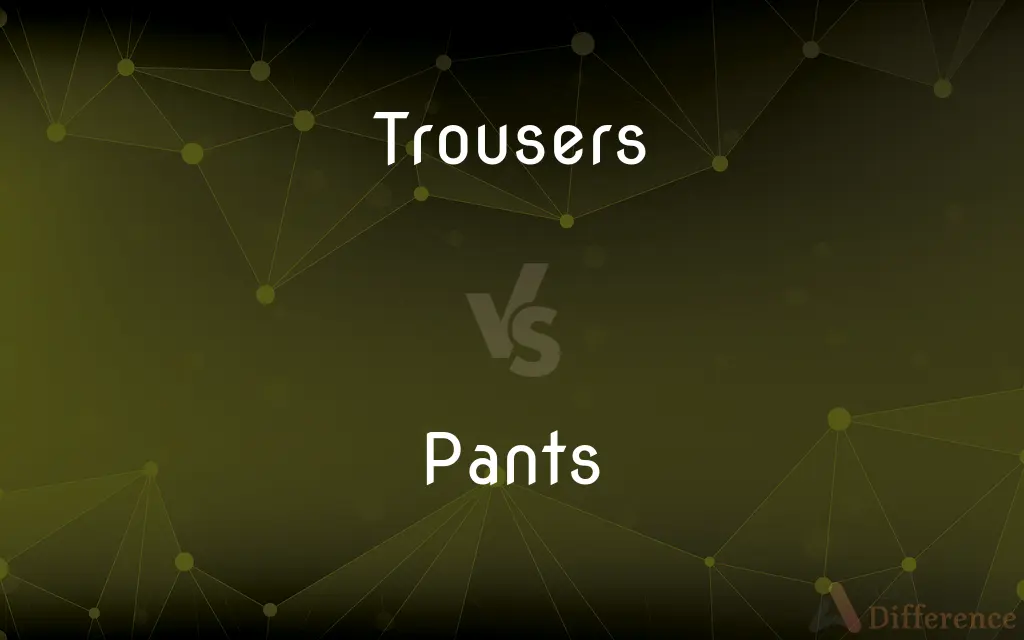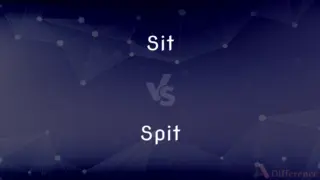Trousers vs. Pants — What's the Difference?
By Tayyaba Rehman — Updated on September 18, 2023
Trousers and pants both refer to an item of clothing worn from the waist to the ankles. The term "pants" is commonly used in American English, while "trousers" is more prevalent in British English.

Difference Between Trousers and Pants
Table of Contents
ADVERTISEMENT
Key Differences
Trousers and pants are words that describe clothing worn on the lower part of the body, covering both legs separately. While they essentially refer to the same garment, their usage predominantly differs based on regional dialects.
In American English, the term pants is the primary word to describe this piece of clothing. When an American mentions "pants," they are referring to what the British might call "trousers." On the other hand, trousers is a term more frequently used in British English to denote the same clothing.
There's a historical nuance to consider: the term pants is derived from "pantaloons," which were a type of tights worn as outerwear in earlier times. Conversely, the term trousers has been used in Britain for centuries to describe outerwear for the legs.
In casual American conversation, pants can encompass a variety of styles, from jeans to khakis. Meanwhile, in Britain, while trousers can refer to many styles, they sometimes use "pants" to refer to undergarments, which can lead to confusion for the unaware.
Regardless of the regional variations, it's essential to note that fashion and clothing industries often use these terms interchangeably, recognizing the global nature of fashion and the fluidity of language.
ADVERTISEMENT
Comparison Chart
Regional Usage
Predominantly British English
Predominantly American English
Origin
Used in Britain for centuries
Derived from "pantaloons"
Relation to Undergarments
In UK, "pants" can mean undergarments
In US, "pants" refers to outerwear
Formality
Sometimes seen as more formal in context
Generally used for all types of legwear
Industry Use
Interchangeably used with "pants" in fashion
Same as trousers in fashion contexts
Compare with Definitions
Trousers
A piece of clothing worn from the waist to the ankles, covering each leg separately.
He wore a smart pair of trousers to the interview.
Pants
An American term for clothing covering the waist to ankles, with separate parts for each leg.
She wore comfortable pants for her hike.
Trousers
Often used in British English for outer legwear.
She purchased three new pairs of trousers for her trip.
Pants
Not typically used to refer to undergarments in American English.
Those are the pants I wore yesterday.
Trousers
Can denote a more formal style of legwear in some contexts.
Black trousers are a must-have for formal events.
Pants
Derived from the term "pantaloons."
Fashion has come a long way from pantaloons to modern pants.
Trousers
Distinct from shorts, which are knee-length or shorter.
In the summer, he swaps his trousers for shorts.
Pants
Underpants or knickers.
Trousers
Typically fastened by a zipper, button, or drawstring.
The trousers had a zippered fly.
Pants
Trousers
Corduroy pants
Wide pant legs
Trousers
Trousers (British English), slacks, or pants are an item of clothing that might have originated in Central Asia, worn from the waist to the ankles, covering both legs separately (rather than with cloth extending across both legs as in robes, skirts, and dresses). In the United Kingdom, the word pants generally means underwear and not trousers.
Pants
Rubbish; nonsense
He thought we were going to be absolute pants
Trousers
An article of clothing that covers the part of the body between the waist and the ankles or knees, and is divided into a separate part for each leg.
The trousers need to be shortened.
Why can women wear trousers when men can’t wear skirts?
Pants
To breathe rapidly in short gasps, as after exertion.
Trousers
A garment worn by men and boys, extending from the waist to the knee or to the ankle, and covering each leg separately.
Pants
To beat loudly or heavily; throb or pulsate.
Trousers
(usually in the plural) a garment extending from the waist to the knee or ankle, covering each leg separately;
He had a sharp crease in his trousers
Pants
To give off loud puffs, especially while moving.
Pants
To long demonstratively; yearn
Was panting for a chance to play.
Pants
To utter hurriedly or breathlessly
I panted my congratulations to the winner of the race.
Pants
A short labored breath; a gasp.
Pants
A throb; a pulsation.
Pants
A short loud puff, as of steam from an engine.
Pants
An outer garment that covers the body below the waist, usually to the ankles, and is divided into sections to fit each leg separately
She decided to wear pants instead of a skirt. He bought a new pair of pants.
Pants
Underpants.
Pants
An outer garment that covers the body from the waist downwards, covering each leg separately, usually as far as the ankles; trousers.
Pants
An undergarment that covers the genitals and often the buttocks and the neighbouring parts of the body; underpants.
Pants
Rubbish; something worthless.
You're talking pants!
The film was a load [or pile] of pants.
Pants
Of inferior quality, rubbish.
Your mobile is pants — why don’t you get one like mine?
Pants
A garment extending from the waist to the knee or ankle, covering each leg separately.
Pants
Underpants.
Pants
Underpants worn by women; panties.
Pants
(usually in the plural) a garment extending from the waist to the knee or ankle, covering each leg separately;
He had a sharp crease in his trousers
Pants
(usually in the plural) underpants worn by women;
She was afraid that her bloomers might have been showing
Pants
Encompasses various styles like jeans, slacks, and khakis.
I need new dress pants for work.
Pants
A ubiquitous term for legwear in casual American English.
Do these pants match my shirt?
Common Curiosities
Are jeans considered trousers or pants?
Both, depending on the region. In the US, they're typically called "jeans" or "pants."
Can trousers refer to casual clothing?
Yes, while sometimes seen as more formal, trousers can refer to any outer legwear.
Are trousers and pants the same thing?
Essentially, yes, but the usage varies by region with "pants" in American English and "trousers" in British English.
Do the British use the term pants at all?
Yes, but it can often refer to undergarments.
Is it wrong for an American to say trousers?
No, it's just less common. The context will usually clarify the meaning.
Are shorts a type of pants?
Not traditionally, as "pants" usually refers to full-length legwear.
What's the origin of the word trousers?
It's derived from the Old Irish word "triubhas."
Can pants be formal wear?
Yes, in American English, "dress pants" refer to formal trousers.
In the UK, what do "pants" refer to?
Often, it refers to undergarments.
How can I differentiate between trousers and pants in fashion?
In fashion, the terms are often used interchangeably. Context and regional usage are key.
What did "pantaloons" originally refer to?
Pantaloons were tight-fitting men's trousers popular in the 19th century.
What do the British call jeans?
They also call them "jeans," but they fall under the broader category of trousers.
Can I use pants and trousers interchangeably?
Yes, especially in global contexts, but be aware of regional nuances.
Are slacks and pants the same?
In American English, slacks often refer to dressier pants.
Are leggings considered pants?
In American English, they can be, though they're more form-fitting.
Share Your Discovery

Previous Comparison
Sit vs. Spit
Next Comparison
Chancellery vs. ChancelloryAuthor Spotlight
Written by
Tayyaba RehmanTayyaba Rehman is a distinguished writer, currently serving as a primary contributor to askdifference.com. As a researcher in semantics and etymology, Tayyaba's passion for the complexity of languages and their distinctions has found a perfect home on the platform. Tayyaba delves into the intricacies of language, distinguishing between commonly confused words and phrases, thereby providing clarity for readers worldwide.














































